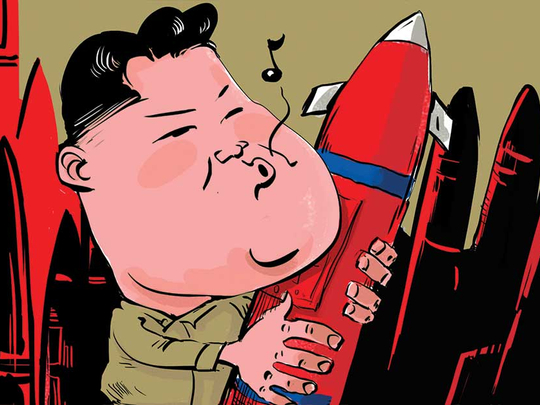
North Korea’s accelerating nuclear and missile programmes, including its recent nuclear test, pose a grave and expanding threat to security, stability and peace in Asia and the rest of the world. This threat affects close US allies — South Korea and Japan — and US personnel and facilities in the region. In the coming months and years, it will create increasing danger for the United States. It is likely that the next president will face a North Korea that has gained the capability to strike the US with nuclear weapons.
US President Barack Obama’s administration has succeeded in strengthening US alliances in Asia and deterring a war, but, like its predecessors, has failed to change Pyongyang’s assessment that defiance is preferable to conciliation. It is clear that the next president will have to sharpen Pyongyang’s choice: offer greater benefits for cooperation and promise greater costs for continued defiance.
For the past several months, we have led a task force to assess the state of US policy toward North Korea and to propose a new comprehensive strategy for the region.
Our goal — and most of the world’s goal — is a stable and nuclear-free Korean Peninsula, at peace in the region and with the world. To achieve that, the world’s leading nations must come together as never before to address North Korea’s nuclear and ballistic missile programmes, prevent it from spreading nuclear and missile technology to dangerous actors, and address its unconscionable human rights record. We do not seek to promote conflict — we seek to promote peace.
We make four principal recommendations, to be implemented in parallel:
1. Addressing the North Korean threat must be a “front-burner issue” for the US and China. China can help get North Korea back to the negotiating table by working with the US, South Korea, Japan and Russia on both diplomatic and economic approaches that will help restart negotiations with North Korea. To encourage China to participate, the US should offer a new dialogue on the future of the peninsula that includes discussion of the disposition of US forces. This dialogue should coordinate planning in the event of a crisis and convey that it is not US policy to cause the collapse of the North Korean regime.
2. Genuine incentives should be offered for North Korea to participate in substantive talks. These talks would include the possibility of a comprehensive deal in which North Korea, South Korea and the US — supported by China — signed an agreement that would finally end the Korean War and gradually normalise relations in exchange for complete nuclear disarmament and progress on human rights. A new diplomatic approach could potentially freeze North Korea’s nuclear and missile programmes and lay the groundwork for a nuclear-free Korean Peninsula.
3. Further steps must be taken to increase economic sanctions that more severely restrict the regime’s funding sources. The Obama administration laid a foundation for this with the strong sanctions recently achieved by the UN Security Council with the support of China and Russia. We recommend creating a standing multilateral mechanism to coordinate the implementation of Security Council resolutions. This should be facilitated by the sharing of intelligence, coordinating enforcement operations and distribution of resources donated by partners outside the region. Strictly enforcing the new Security Council sanctions, including the mandate to inspect all North Korean cargo and apply serious economic pressure, can help curb criminal activity from the regime, and, most important, prevent the spread of nuclear and missile materials and technology. Current enforcement of sanctions is far too lax.
4. The US should secure its interests and those of its allies against the North Korean nuclear and missile threats by expanding US-South Korea-Japan cooperation and strengthening its joint deterrence profile. The Pentagon should step up its work with US allies to build the capacity necessary to enhance deterrence on the peninsula, enforce sanctions and impede North Korean missile programmes. Expanded naval capacity will be needed to interdict North Korean vessels, detect submarine activity and intercept North Korean missile launches.
If Pyongyang refuses to negotiate, the US and its allies should judiciously apply new military measures to deny North Korea the benefit of its actions and to strengthen deterrence against military attacks. This can include the US, South Korea and Japan jointly signalling that future North Korean aggression would be met with an active and proportionate self-defense response, including inside North Korea.
We also recommend that the US and its allies jointly build the capacity to intercept all missiles originating from North Korea with a range-payload capability greater than existing Scud missiles (approximately 1,000km) — whether they are declared to be ballistic missile tests or civil space launch vehicles.
These responses to North Korea’s continued defiance of UN resolutions will not be easy and are not without risk. We do not support a policy of inducing a collapse of the North Korean regime, and these steps will have to be carefully implemented. North Korea continues to commit unconscionable crimes against its citizens. We recommend working through the United Nations to increase pressure on North Korea to abide by internationally recognized standards for human rights, including by suspending North Korea’s credentials
North Korea presents one of the most dangerous international security challenges facing the world. In April, Chinese President Xi Jinping told a group of foreign diplomats that his country “will never allow war or chaos on the peninsula,” a statement that seemed to apply to all parties. The US and China have a shared and vital national interest in preventing this from occurring. The time to act on that interest is now.
— Washington Post
Mike Mullen, a retired US Navy admiral and former chairman of the Joint Chiefs-of-Staff, and Sam Nunn, a former Democratic senator from Georgia, are co-chairs of the Independent Task Force on US Policy Towards North Korea.









